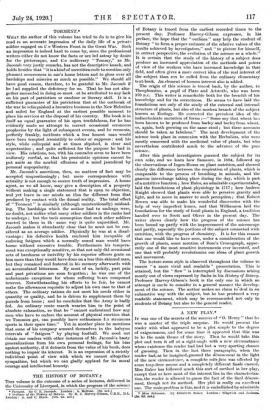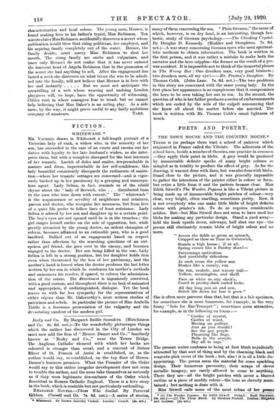A NEW PLAY.*
IT was one of the secrets of the success of "0. Henry" that he was a master of the triple surprise. He would present the reader with what appeared to be a plot simple to the degree of exiguousness, and for some time it appeared that this was to be the main theme of the story. Then he would take this plot and turn it off at a right-angle with a new circumstance whose existence the reader had had but a very sporting chance of guessing. Then in the last three paragraphs, when the reader had, as he imagined, guessed the denouement in the light of the new circumstance, a complete voile-face was effected by some trap-door means and a completely different finale ensued. Miss Baker has followed much this sort of method in her play, except that as here most of the interest lies in the characteriza- tion, the reader is allowed to guess the fact of the final dinoue. meat, though not its method. Her plot is really an excellent one. The main problem is this, and it is embellished by admirable • Miss Robinson. By Ellrabetb Baker. London: BidgwIck and Jackson. lSe.sa. net.]
characterization and local colour. The young man, Horace, is found making love to his father's typist, Miss Robinson. Ten minutes later Miss Robinson accidentally discovers a secret whose publication would blow that rising politician, her employer, and his aspiring family completely out of the water. Horace, the family decide, must marry Miss Robinson to shut her mouth. The rising family are snobs and vulgarians, and (save only Horace) do not realise that it has never entered the innocent head of Angela Robinson that in the possession of the secret she had anything to sell. After the engagement has lasted a week she discovers on what terms she was to be admit- ted into the family, will not believe that Horace is in love with her and instantly But we must not anticipate the unravelling of a web whose weaving and undoing London playgoers will, we hope, have the opportunity of witnessing. Critics rush in where managers fear to tread, but we cannot help believing that Miss Baker's is an acting play. As a side issue, by the way, it might prove useful to any fairly ambitious



































 Previous page
Previous page